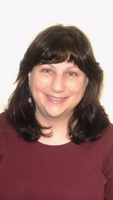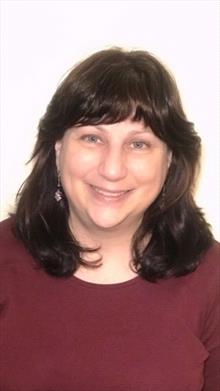
Dr. Karen Fine

Photo by Bethany Wotatwa Weinberg-O’Brien
Dr. Karen Fine
A few years ago, I was surprised to learn that the veterinary profession has a higher-than-average risk of suicide. As I considered that fact, somewhere deep inside me, something clicked.
"It's not just me," I realized.
I had to push past a lot of mental barriers to admit that I sometimes struggled. After all, I loved my work! I felt so blessed to have my career. It wasn’t hard for me. Well, OK, maybe dealing with euthanasia, illness and end-of-life issues could be considered hard, but it was what I did. It didn’t need to be discussed. I had learned how to cope on my own, and veterinary school — all those years ago — had taught me to be stoic. I could handle it. I was strong. I was tough. I was well-trained.
Then I thought about the feeling of isolation I’ve experienced when a client says, "I could never do what you do." The feeling of shame when a patient dies despite my best efforts. The familiar internal reviewing of my actions, with a focus on mistakes I might have made. The feeling of dread when I see a radiograph or blood-work results or palpate a mass and know I must give a client terrible news. The frustration and helplessness when a client won't euthanize a suffering animal, or when I euthanize a treatable animal. The emotional bond with a suffering client. The times I've been sad, numb, up at night.
This is hard, I realized.
And it's OK to say it.
I've been surprised at how much better that simple acknowledgment has made me feel. It is not an excuse for self-pity. It's simply a clear-eyed, realistic view of my chosen profession, to replace the previous distorted view in which I dealt with difficulties but denied their effects.
While I never have been suicidal, I have struggled with depression and anxiety. I've had difficulty with boundaries, found it hard to say no to clients and become overly emotionally involved with their situations. Recognizing that "this is hard" has helped me give myself permission to work at keeping healthy boundaries in place and to treat myself with compassion when I have a bad day.
Recently, I've thought more about the difficulties faced by veterinarians, especially when it comes to what is arguably one of the biggest taboos in our culture: death. When faced with a euthanasia, I am hyperaware that it may be one of the hardest days of the client’s life. During the procedure itself, I feel the need to balance three challenging responsibilities simultaneously: I must maintain my composure as a professional performing a precise technical task in front of a layperson, focus on the patient to ensure that the animal is euthanized as humanely as possible, and support the client(s) in their grief and pain.
Recently, after the euthanasia of his dog, a client confided in me as we stood outside in the cold, his dead dog in the car. He had already dug the grave, he said. Then he told me that after his son had died, he was able to tell the dog what he had been unable to say to his wife.
Sometimes, I feel like we are on the front lines of human suffering, as well as animal suffering.
Our staff are affected by death, as well. What is it like for a technician or assistant who has given an animal subcutaneous fluids weekly for years to have to "bag" that animal's body and place it in the freezer? What is it like for a receptionist who has greeted the client weekly to have to schedule the pet's euthanasia? They, also, bear witness to suffering, both human and animal.
I've watched with pride as our profession has focused on wellness and suicide prevention. Yet I feel that there is more we can do. What if we focused on what, specifically, is hard, with an emphasis on practical tools and support? There are several resources and ideas that I believe could be further explored and utilized to help our profession:
- Using continuing education and veterinary student programming to focus on not only compassion fatigue and burnout, but also how to deliver bad news, handle ethical challenges and support grieving clients. Possibly we could collaborate with physicians in a One Health model, as they, too, deal with these issues. (One Health is an international initiative that recognizes that the health of humans, animals and the planet are intertwined.)
- Providing coping tools and practices for veterinary teams, such as having a moment of silence during a staff meeting for all of the patients who have died recently. Veterinarians and staff need to support one another.
- Incorporating wellness programming that acknowledges that our work is difficult; in other words, addressing why wellness care is so important.
- Considering the work of Brené Brown on how to recognize and avoid shame. Brown has spent years studying shame and vulnerability, and her work offers many helpful insights into identifying and overcoming shame. Shame may be the prevailing emotion when we struggle to reach the impossibly high standards of our profession. We need to acknowledge that we cannot satisfy every client, cure every case, meet every need.
- Examining the field of Narrative Medicine, a recent development in human medicine. This approach, which is studied now in many medical schools, helps place disease and illness within the context of a patient's larger story and considers the clinician's story, as well. I have written about Narrative Medicine for DVM360, and Dr. Michele Gaspar, a veterinarian and psychotherapist, has discussed it in a Rounds session with colleagues on the Veterinary Information Network. As this approach is nearly nonexistent in veterinary practice, we have an opportunity to create a discipline that can help our profession. Possible venues for learning and talking about Narrative Medicine include a VIN message board, a club for veterinary students and/or an online journal.
- Exploring perfectionism, a common trait among gifted individuals (search "perfectionism gifted" for more information). It is likely that many veterinarians are gifted. Research on gifted people has focused mainly on perfectionism in children, although adults clearly also suffer from its effects. Experts in behavior of gifted individuals may have some insights to share on how to handle this attribute, with an emphasis on the specific ways that perfectionism affects veterinarians.
- Putting a focus in veterinary schools on modeling supportive environments for students, including work/life balance and the transition to general practice. (A specific issue that I and many of my colleagues recall from veterinary school is the harsh criticism of referring veterinarians by veterinary school faculty. The head-shaking and eye-rolling of clinicians as they criticized general practitioners was stamped on my psyche. As a result, I felt tremendous anxiety for years each time I referred a case.)
- Teaching veterinary students more than stoicism, such as how to set boundaries and how to handle the complicated emotions that arise in our work. For instance, providing tips on when to consider "firing" a client and having frank discussions on how to cope with sadness rather than ignore it.
- Continuing to collaborate with the field of veterinary social work. Veterinary social work is a new, growing discipline that, as described by the University of Tennessee Knoxville, "attends to the human needs that arise in the intersection of veterinary medicine and social work practice." Many veterinary schools now have veterinary social workers on staff, counseling students and faculty as well as clients.
- Continuing to emphasize mindfulness and meditation as helpful tools.
I'm sharing my thoughts and experiences in the hopes that others will feel encouraged to share their own. I hope to see our community continue to support one another effectively and with compassion, the way we treat our patients.
Karen Fine, DVM, graduated from Tufts University School of Veterinary Medicine (now Cummings) in 1992 and became certified in veterinary acupuncture in 2002. In 1995, she opened a small house-call practice in central Massachusetts that she still operates, along with working part-time at a five-doctor hospital practicing integrative medicine. She has completed the Mindfulness-Based Stress Reduction program. Fine has written for DVM360 and The Bark magazine and is working on a memoir. She lives with her husband, son and assorted rescues. The sign on her office door reads, “Will work for chocolate."